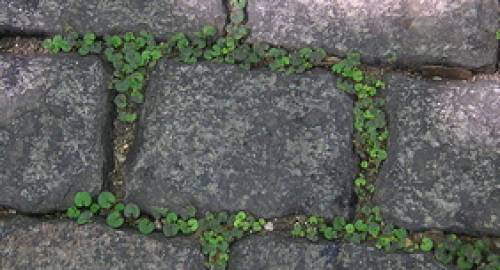
What does driveway sealant have in common with aerosol cans — and what’s that got to do with paving stones, anyways? Here’s a hint: The first two can mess you up with invisible airborne contaminants. As for paving stones, at least you can see them coming when they go airborne.
Duck with me below the fold to find out more about reducing the environmental and health hazards of driveway sealant and aerosol cans – and how paving stones can help.
Aerosol Cans
If you’re reading this post, chances are that you cut down on aerosol cans as soon as you started to go green. Among other things, they can be very hard to recycle. Also, kids can huff them. If you still use them occasionally, check with your local recycling program for guidance before you throw the empties away.
Driveway Sealant
Driveway sealant, on the other hand, might not have caught your attention yet. Two words: coal tar. Conventional driveway sealant is made with coal tar. A recent study has linked the coal tar in driveway sealant to – well, it’s not a pretty picture.
[social_buttons]
What are the Choices?
Fortunately, coal tar-based driveway sealant and aerosol cans have one other thing in common: they’re not the only fish in the sea. You have a choice when it comes to many household products, aerosol and non-aerosol. The same goes for driveway sealant.
Before you use a driveway sealant or hire a contractor, check the product. The US Department of Health and Human Services has a handy online directory with complete information about the ingredients and potential health risks for driveway sealants and many other household products. You can search the database by the product’s name or type.
How Paving Stones Can Help
If a total driveway re-do is in your household budget, you can ditch the whole idea of sealant. A permeable driveway be made of eco-friendlier paving stones, concrete pavers, gravel, grass, and many other materials.
Aside from reducing potentially toxic substances on your personal property, paving stones and other permeable driveways help filter and cleanse stormwater. That’s healthier for your local waterways, and it can also help prevent local flooding.
Permeable driveways can permit plant growth, which helps cool your property in hot weather. You can also construct your permeable driveway with light-colored gravel or pavers that absorb less heat in the summer.
Maintaining a Permeable Driveway
There are a couple of things to keep in mind once your permeable driveway is installed. To keep detergents from leaching into the soil (and from there into your local waterways), avoid washing your car in the driveway. Commercial car washes generally treat their wastewater, and they recycle their water.
If weeds become a problem, check with your local garden shop on eco-safe ways to keep them at bay. A dose of boiling water can sometimes do the trick.
Follow-up: Ugo the Dog
One commenter on my previous post on pet waste (featuring Ugo the dog and his co-op board travails) raised a good point regarding urban pet waste composting. The idea would be to establish a centralized collection system. It turns out that San Francisco is one step ahead of us (as usual).
Image: blumurch at flickr under creative commons.
[…] Could This Paving Stone Save Your Life? : Eco Child’s Play. […]